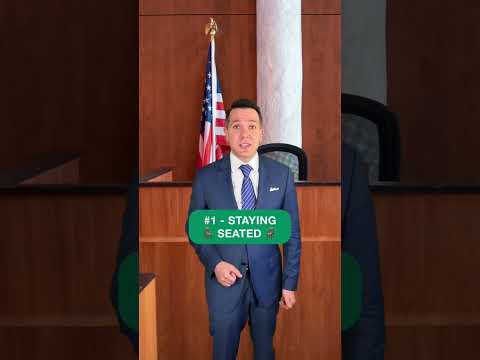
Exploring the Limits of Testimony: The Implications of Saying “I Don’t Know” in Court
Welcome to this informative article where we delve into the fascinating world of testimony in the US legal system. Before we begin, it’s important to note that while this article aims to provide insight and guidance, it should not be considered a substitute for professional legal advice. Always consult with qualified sources or legal advisors to ensure accuracy and thoroughness.
Now, let’s embark on a journey to understand the limits and implications of saying those three words that seem so simple yet carry significant weight in a courtroom: “I don’t know.”
📋 Content in this article
In legal proceedings, witnesses are called upon to provide factual information relevant to a case. Their testimonies can be crucial in determining the truth and reaching a just verdict. However, what happens when a witness is unable or unwilling to provide a clear answer? This is where the phrase “I don’t know” comes into play.
1. The Duty to Provide Truthful Testimony
When called to testify, witnesses are under a legal obligation to provide truthful and accurate information to the best of their knowledge. This duty is essential to the integrity of the justice system and serves as the foundation for fair and just outcomes. However, there may be instances when a witness genuinely does not have knowledge of a particular fact or cannot recall it accurately. In such cases, it is important for the witness to express their uncertainty honestly.
2. The Significance of “I Don’t Know”
While saying “I don’t know” can reflect an honest lack of knowledge or memory, it is crucial to understand its potential implications. In some situations, opposing counsel may attempt to exploit this uncertainty, seeking to cast doubt on the witness’s credibility or the strength of their testimony. Therefore, it is important for witnesses to exercise caution when using this phrase and provide context and explanation whenever possible.
3.
Understanding the Legal Implications of Saying I Don’t Remember in Court
Exploring the Limits of Testimony: The Implications of Saying I Don’t Know in Court
When it comes to providing testimony in a court of law, being honest and forthcoming is of utmost importance. However, there may be instances where a witness genuinely cannot recall certain details or events. such cases, the phrase “I don’t know” or “I don’t remember” may be used. While these statements reflect a lack of memory, it is essential to understand the legal implications associated with invoking them during court proceedings.
Testimony forms a crucial part of the evidence presented in court, and witnesses are expected to provide accurate and reliable information to assist in the search for truth. However, memory is a complex cognitive process, and it is not uncommon for individuals to forget certain details over time. When a witness is genuinely unable to remember something, it is important to communicate this fact truthfully. However, it is essential to be aware that the phrase “I don’t know” or “I don’t remember” can have legal implications.
To better comprehend the implications of such statements, let us explore some key points:
What to Avoid Saying When Testifying in Court: Essential Guidelines for Effective Testimony
What to Avoid Saying When Testifying in Court: Essential Guidelines for Effective Testimony
When it comes to testifying in court, what you say can have a significant impact on the outcome of your case. The words you choose and how you present yourself as a witness can greatly influence the judge and jury’s perception of your credibility. It is crucial to understand the importance of effective testimony and to be aware of what to avoid saying when taking the witness stand. This article will explore the limits of testimony and specifically focus on the implications of saying “I don’t know” in court.
Title: Exploring the Limits of Testimony: The Implications of Saying “I Don’t Know” in Court
Introduction:
In the realm of US law, the reliability and accuracy of witness testimony hold significant weight in determining the outcome of legal proceedings. However, there are instances when witnesses are unable to provide a clear answer and resort to saying “I don’t know.” This article examines the implications of such statements in courtrooms, highlighting the importance of staying informed on this topic. It is essential to note that readers should verify and cross-reference the information provided here, as laws and regulations may vary across jurisdictions.
The Importance of Witness Testimony:
Witness testimony serves as a key component in establishing facts, understanding events, and presenting evidence in court. Witnesses are expected to recount their experiences truthfully and to the best of their ability. Courts heavily rely on this testimony to reconstruct a comprehensive narrative and reach a just verdict. However, several factors can influence the accuracy and reliability of witness statements, leading to instances where the witness responds with “I don’t know.”
Understanding the Implications:
1. Credibility Assessment: When a witness says “I don’t know,” it raises questions about their credibility and knowledge regarding the subject matter. The judge and jury carefully evaluate whether the witness genuinely lacks knowledge or is purposefully withholding information. This assessment is crucial to determine the weight given to the remainder of the testimony.
2. Impact on Perception: Jurors and judges may interpret an “I don’t know” response differently depending on the circumstances. If it appears that the witness genuinely lacks knowledge due to lack of memory or limited exposure, it may not significantly impact their overall credibility. However, if a witness frequently resorts to this response or selectively claims ignorance on crucial matters, it may raise doubts about their reliability.
3. Limitations on Experts: Expert witnesses, who possess specialized knowledge or skills, often face limitations when they are unable to provide a definitive answer.
